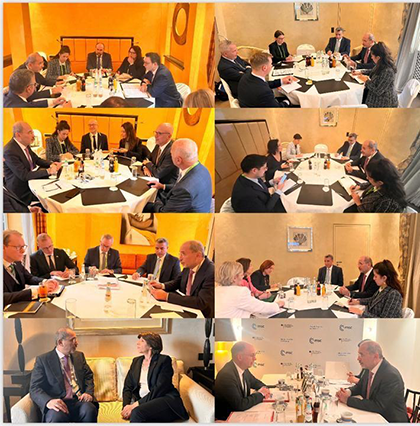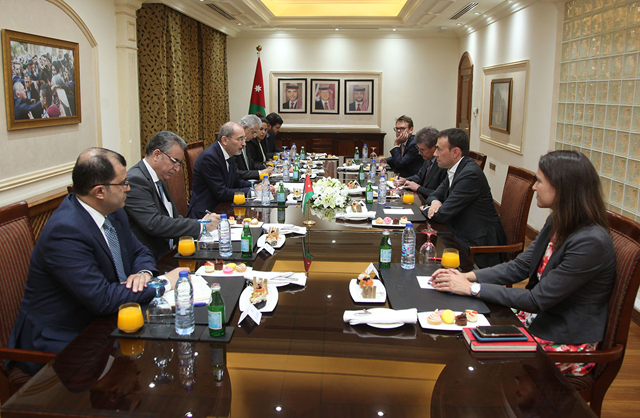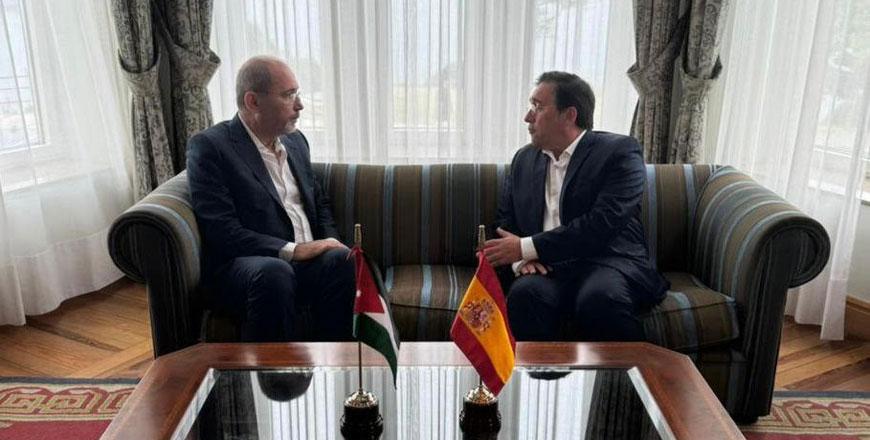You are here
Foreign minister holds series of meetings on sidelines of Munich Security Conference
By JT - Feb 18,2023 - Last updated at Feb 19,2023

Deputy Prime Minister and Foreign Minister Ayman Safadi on Saturday held talks with a number of his counterparts and officials participating in the Munich Security Conference (Photos courtesy of Foreign Ministry)
AMMAN — Deputy Prime Minister and Foreign Affairs Minister Ayman Safadi on Saturday held talks with several counterparts and officials participating in the Munich Security Conference 2023 over bilateral relations and regional issues, especially the Palestinian cause.
Safadi stressed that the international community must act immediately and effectively to stop Israel's illegal and provocative actions that undermine the two-state solution and threaten the present situation in occupied Palestine, according to a Foreign Ministry statement.
During meetings with 17 foreign ministers and officials, Safadi explained that such illegal Israeli measures include settlements, house demolitions, the displacement of Palestinians from their homes and attempts to change the historical and legal status quo of the Islamic and Christian holy sites in occupied Jerusalem.
The minister also noted further illegal Israeli procedures, such as placing economic restrictions upon the Palestinian people.
Undermining the two-state solution and losing confidence in the profitability of the peace process pushes towards a potential outbreak of violence, just before this year's holy month of Ramadan, which coincides with Christian and Jewish religious holidays, the minister said.
A just, lasting and comprehensive peace, which the Kingdom and all Arab states are working to achieve, is a strategic choice, and a prerequisite for regional and international security and stability, he added.
This peace cannot be achieved without the establishment of an independent and sovereign Palestinian state with Jerusalem as its capital on the pre-1967 lines, to live in peace and security alongside Israel, Safadi said.
The minister also discussed the steps that must be taken and the Kingdom's efforts with its partners in the international community to stop the deterioration in the occupied Palestinian territories and create a political ground for the return to serious and effective negotiations towards the two-state solution, which Safadi identified as the only way to end the conflict and achieve security, stability and peace.
He also stressed the “impossibility” of allowing the current situation in Syria to continue, reiterating the need to intensify efforts to reach a political solution that guarantees Syria's unity and cohesion, restores its security, stability and role, meets the aspirations of the Syrian people, frees the country from terrorism, leads to the departure of foreign forces and creates conditions for the voluntary return of refugees.
Safadi stressed the need to deliver relief and humanitarian assistance to all Syrian people affected by the recent earthquakes, and to stand with Syria and Turkey in facing the consequences of the natural disaster.
He also warned of the difficult humanitarian and social repercussions of the decline in international support for refugees. Ensuring decent and dignified living conditions for refugees in an international responsibility that should not be borne solely by host countries, Safadi added.
During meetings with his counterparts, the minister also discussed methods of developing bilateral relations, particularly in terms of the economy, investment, security and defence.
Safadi acquainted his counterparts with the political, economic and administrative reforms and modernisation programmes that Jordan has implemented to improve the Kingdom’s economic performance and manage the ramifications of regional crises.
Safadi met with Irish Deputy Prime Minister and Minister of Foreign Affairs and Defence, Micheal Martin; Deputy Prime Minister and Minister for Foreign Affairs of Slovenia, Tanja Fajon; Federal Minister for Foreign Affairs of Germany, Annalena Baerbock; and Minister of Foreign Affairs of Belgium, Hadja Lahbib.
He also met with French Minister for Europe and Foreign Affairs, Catherine Colonna; Swedish Minister of Foreign Affairs, Tobias Billström; Spanish Minister of Foreign Affairs, the European Union and Cooperation, José Manuel Albares; Czech Foreign Minister, Jan Lipavsky; Norwegian Foreign Minister, Anniken Rietveld; and Minister for Foreign Affairs of Finland, Pekka Haavisto.
Safadi also held talks with Minister for Foreign Affairs of Estonia, Urmas Reinsalu; Minister of Foreign Affairs of Pakistan, Bilawal Bhutto Zardari; and Parliamentary State Secretary at the German Federal Ministry for Economic Cooperation and Development, Niels Annen.
He also met with US Senator Chris Van Hollen, a member of the US Senate Appropriations Subcommittee for State, Foreign Operations and Related Programmes; President of Global Affairs at Goldman Sachs, Jared Cohen; CEO of the American Jewish Committee, Ted Deutch; and a delegation from The Elders Group.
Also on the sidelines of the conference, Safadi met with the German Bundestag’s Social Democratic Party Spokesperson for Foreign Affairs, Nils Schmid, over the "deep" nature of bilateral relations and partnership between Jordan and Germany.
Safadi also commended the level of existing cooperation between the two countries regarding the economy, development and defence, emphasising current endeavours to broadly expand coordination.
For his part, Schmid praised the level of cooperation and coordination between Germany and the Kingdom, expressing his country's appreciation of Jordan’s “pivotal role” in supporting efforts to realise security and stability in the region.
He also stressed the need to continue supporting the Kingdom and helping Jordan shoulder burdens stemming from regional crises.
Related Articles
AMMAN — Deputy Prime Minister and Foreign Minister Ayman Safadi on Monday met a German delegation headed by MP Nils Schmid, spokesperson on
AMMAN — Deputy Prime Minister and Foreign Minister Ayman Safadi on Tuesday met with German Foreign Minister Annalena Baerbock and discussed
AMMAN — Deputy Prime Minister and Foreign Minister Ayman Safadi on Monday met Spanish Minister for Foreign Affairs, European Union and Coope













